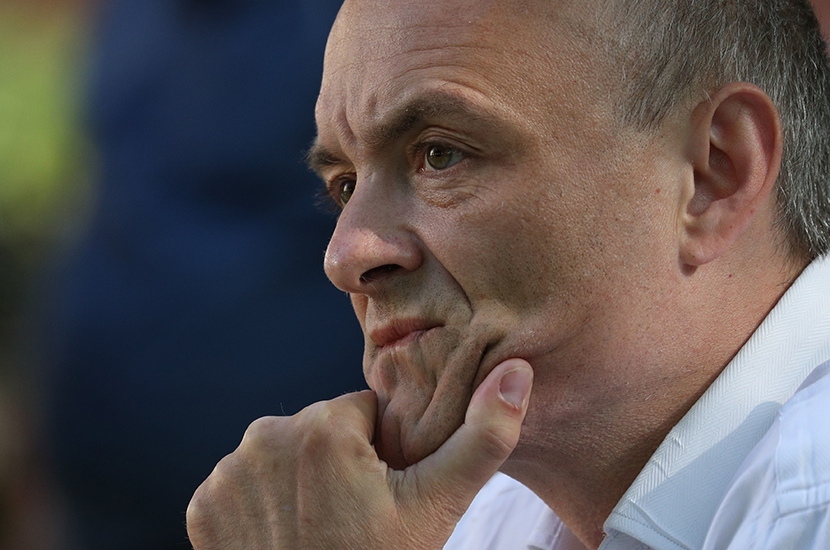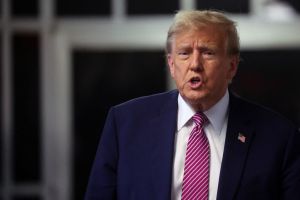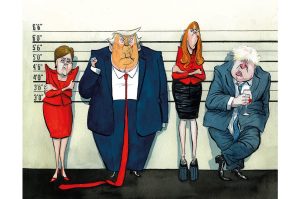When the British cabinet met by conference call on Monday, three ministers spoke in support of Dominic Cummings: Jacob Rees-Mogg, Suella Braverman and Priti Patel. Their sentiments were not universally shared. ‘Several of us started feeling ill when Jacob opened his mouth,’ says one attendee. ‘Silence from the parliamentary party is damning.’
But many critics of Cummings now think that, having dug in so deeply, the UK Prime Minster has to keep his man. To need to fight this much for an aide is bad enough. But to fight and lose would be devastating.
This explains the energy behind the pursuit of Cummings in the past few days. The disclosure that Boris Johnson’s senior aide traveled 260 miles from London during lockdown isn’t just an easy issue on which to criticize the government — it’s also provided the Prime Minister’s critics with their biggest chance yet at destabilizing Johnson’s operation. It became clear pretty quickly that this was not about the fate of one adviser, but about the authority of the PM and the viability of his government.
Anyone unconvinced need only look at the lengths taken to protect Cummings. He was given a personal press conference in the Downing Street rose garden (once used for the coalition announcement). The Prime Minister offered his full backing at two further press conferences. A slew of cabinet members were sent out to offer their support, and a review of lockdown childcare penalties was even mooted by the Health Secretary. ‘If it were anyone else, he would no longer be in place,’ says a minister.
But Cummings is not as important as an average cabinet member. He’s far higher up. When Sajid Javid as chancellor came to blows with Cummings, he asked Johnson to choose between them. He found out the hard way where the PM’s loyalties lie. Tory MPs have long been uncomfortable with all this, and the idea of an all-powerful No. 10 issuing orders. Now that Cummings is on the ropes, they spy an opportunity to change things.
When they worked together in education, Michael Gove described Cummings as his dæmon — the animal manifestation of a person’s inner self from Philip Pullman’s His Dark Materials — who fed off his instincts and did things that he, as a minister, would not dare. Cummings’s work ethic, his effectiveness and his lack of interest in the opinions of critics tend to get results. He helped Gove pass the Academies Act in 66 days. He helped Johnson win the Brexit referendum, and then helped him secure a Tory majority of 80 against all the odds. His style is to work with a tight team, taking quick decisions.
To apply these methods in a system supposedly run by cabinet government was always going to cause tension. The weekly cabinet meeting has become more decorative, with many of those present sensing that they are going through the motions. The cabinet is already split in two. The inner cabinet — Gove, Matt Hancock, Dominic Raab and Rishi Sunak — are on the Prime Minister’s morning coronavirus call where key decisions are taken and information is shared. Several of those cabinet ministers not present — nicknamed the ‘outer cabinet’ — have grown resentful of being left in the dark.
Whether or not Cummings stays in post, cabinet ministers see in the latest drama an opportunity to change the power balance to their advantage. ‘He will struggle to command the same respect as before or even to give orders,’ argues one. Others agree: ‘We need to stop treating him as some high prophet rather than an adviser.’
The lockdown hawks are pressing for a change in tone on social distancing — altering the emphasis so that everything is allowed except for specific things (i.e. certain industries remaining closed) on the grounds it would provide the most clarity in the current climate.
While ministers may be working out how to get the upper hand, it’s the backbenchers who will prove harder to control. Even before this crisis, No. 10 put little time into wooing MPs or nurturing party morale. It’s harder to do in lockdown: it took Johnson several weeks to hold a Zoom call with his party troops. Aides and whips have already been facing up to the reality that a majority of 80 doesn’t allow you to just do what you like. A recent U-turn on the National Health Service migrant surcharge showed that. The speed at which Tory MPs have gone public to criticize Cummings should give further food for thought.
The rebellion runs deeper than the usual suspects. As well as old foes including Damian Collins and Steve Baker, a raft of new MPs in the ‘red wall’ have aired concerns. ‘If you don’t have your new intake onside, what are you even doing?’ complains one bemused MP. A usually loyal MP says they have been looking for reasons to support No. 10 through this but struggling to find them. ‘I don’t have any axe to grind but it’s hard to defend. In the court of opinion, this is an unwinnable case.’
***
Get three months of The Spectator for just $9.99 — plus a Spectator Parker pen
***
Some have at least found a line to argue. Supportive MPs have been telling skeptical colleagues that this will end up a storm in a Westminster teacup: look, they say, at the fate of David Cameron’s spin doctor Andy Coulson. ‘In the end, nobody cared about Coulson’ — though it didn’t exactly end well.
But the Cummings drama is a story as much about the Prime Minister as it is the aide. That Johnson would become so reliant on any individual has triggered alarm. His decision to spend so much political capital keeping his aide in place has led to questions over his judgment. ‘Put it this way — it’s crystallized people’s sense that we are not handling this crisis right,’ says a moderate Conservative MP. ‘A lot of people are openly saying: can Boris Johnson do this?’
At the start of a five-year parliament there is time for wounds to heal. And time to reform Whitehall in a way that removes the need for a svengali. This is, oddly enough, Cummings’s stated mission: to hire more people and make himself ‘largely redundant’ by Christmas. But for now, there is no one like him. No one the Prime Minister needs more. The battle to depose him will continue for some time yet.
This article was originally published in The Spectator’s UK magazine. Subscribe to the US edition here.


















